Table of Contents
Tryptophan is the sole precursor of serotonin. L-Tryptophan’s role in brain serotonin synthesis is critical for mood, behavior and cognition.
Serotonin is often referred to as the “happiness molecule”. Low serotonin levels can result in pain, insomnia, depression, seasonal affective disorder, and chronic fatigue.
For your body to manufacture serotonin, it needs an adequate supply of the natural amino acid Tryptophan. As a nootropic supplement, Tryptophan is used for anxiety, ADHD, depression, insomnia, memory loss, pain, and eating disorders.[i]
A lack of bioavailable Tryptophan in your body can have a big impact on your life.
Tryptophan helps:
- Anxiety & Mood. Tryptophan is an essential amino acid needed to synthesize serotonin which plays a role in mood, sleep, learning and even appetite control.
- ADHD. Low levels of Tryptophan and serotonin imbalances in the brain are associated with ADHD. Studies have found that children with ADHD have 50% lower than average levels of Tryptophan.[ii]
- Neurotransmitters. Low levels of Tryptophan can result in short- and long-term memory loss. Supplementing with Tryptophan has been found to improve memory in healthy adults.
Overview
Tryptophan is an essential amino acid and precursor to serotonin, melatonin and niacin (Vitamin B3) in your body.
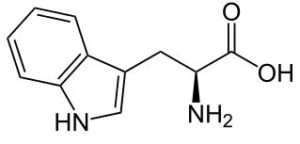
The enzyme Tryptophan hydroxylase converts Tryptophan into 5-HTP (5-hydroxytryptophan).
The decarboxylation of 5-HTP to serotonin is dependent on the presence of Vitamin B6, also called pyridoxal 5’-phosphate (P5P).
The further conversion of serotonin into melatonin requires the presence of SAM-e (S-Adenosyl-L-methionine).
Tryptophan is found in foods like oats, bananas, dried prunes, milk, tuna, cheese, bread, chicken, turkey, peanuts and chocolate.
Eating food containing Tryptophan will increase levels of this amino acid in your body. But not necessarily boost serotonin levels in your brain. Here’s why…
Tryptophan is one of 8 essential amino acids and has the lowest concentration in the body of all the amino acids. Tryptophan requires and competes for active transport to the brain. And competes for the same receptors as the other amino acids.
Research has also found that serotonin levels are enhanced by carbohydrates in your meals because insulin release accelerates the serum removal of some of the amino acids that Tryptophan is competing with.
And if your meal has a higher percentage of proteins, it also slows serotonin elevation in your brain.[iii]
Since Tryptophan from food has issues working its way to your brain to make serotonin, why not skip that step and supplement with 5-HTP instead? Tryptophan and 5-HTP both penetrate the blood-brain barrier. And 5-HTP is the intermediate step in serotonin synthesis.
See my post on 5-HTP for more on why supplementing with 5-HTP instead of Tryptophan is not such a good idea.
How does Tryptophan work in the Brain?
Tryptophan boosts brain health and function in several ways. But two in particular stand out.
- Tryptophan boosts memory. Tryptophan’s main nootropic mechanism of action is as a precursor to the neurotransmitter serotonin. Other neurotransmitters such as melatonin and beta-endorphin increase following Tryptophan supplementation.[iv]
Research shows that Tryptophan and serotonin play a significant role in memory. Enhanced brain serotonin has been shown to improve cognitive performance in animals and humans. And decreasing levels of serotonin through Tryptophan depletion impairs cognition.
A study done in Pakistan assessed memory in rats following Tryptophan administration. The rats received Tryptophan doses of 50 and 100 mg/kg of body weight for 6 weeks. The study showed significant improvement in memory of rats following both doses of Tryptophan.[v]
- Tryptophan enhances mood. As a precursor to serotonin, Tryptophan can have a significant effect on mood. Supplementing with Tryptophan has been found to increase not only serotonin, but growth hormone and prolactin as well.
Researchers infused 11 healthy male subjects with doses of 5, 7.5 and 10 grams of Tryptophan. And then monitored their hormonal and behavioral responses.
Tryptophan produced significant effects on mental and physical sedation but did not increase levels of tranquilization. Tryptophan provided a calming effect without knocking these guys out even at high doses.[vi]
How things go bad
As we get older, our brain chemistry and energy metabolism changes.
↓ Tryptophan levels decline
↓ Tryptophan hydroxylase levels decline
↑ Stress, insulin resistance and age increase
↓ Magnesium and Vitamin B6 levels decline
↓ Neurotransmitter levels decline
↓ Concentration, working memory and executive function decline
↓ Appetite regulation, energy and alertness decline
All of these changes can happen at an age. And are influenced by declining Tryptophan levels. Very little dietary Tryptophan is available for protein and serotonin synthesis. And for many people this can be a problem.
Anxiety, depression, ADHD, memory loss, binge eating and a host of other mental and physical issues have been correlated with low Tryptophan levels.
Tryptophan benefits
Just living in our modern society seems to leave us irritable, stressed-out, and anxious. Worst case is problems sleeping, depression, aggressive behavior, reduced motivation, pain and even suicidal thinking.
 And all have been traced to not enough serotonin in our brain.[vii]
And all have been traced to not enough serotonin in our brain.[vii]
Serotonin, the happiness molecule relies on an adequate supply of Tryptophan for synthesis. Researchers now recognize that the role serotonin plays in psychiatric and behavior disturbances comes from Tryptophan depletion.[viii]
Tryptophan hydroxylase is the rate-limiting enzyme needed for serotonin production. And is involved in the conversion of Tryptophan to 5-HTP (5-Hydroxytryptophan) needed to make serotonin.
This enzyme (Tryptophan hydroxylase) can be inhibited by stress, insulin resistance, magnesium or Vitamin B6 deficiency, or increasing age.
Tryptophan and 5-HTP can penetrate the blood-brain barrier. But Tryptophan requires active transport and competes for the same receptors with other amino acids including tyrosine, phenylalanine, valine, leucine, and isoleucine.[ix]
To complicate things even more, serotonin levels are enhanced by carbohydrates in our diet because insulin release accelerates serum removal of the amino acids competing for Tryptophan transport. And high levels of protein in our diet slows increase in serotonin.[x]
So now you know why it’s helpful to add supplemental L-Tryptophan to your nootropic stack.
How does Tryptophan feel?
Many try L-Tryptophan the first time to cure insomnia or as an alternative to prescription sleep meds.
Dosing L-Tryptophan in the evening will typically ensure you’ll feel great the next day. You should have more energy for working out.
Anxiety levels should decrease. Happiness levels should rise. Tryptophan could help with memory. Music will sound better. Feelings of self-esteem will improve.
Some neurohackers report being able to taper off prescription antidepressant meds by supplementing with L-Tryptophan.
Tryptophan Clinical Research
5-HTP and Tryptophan are natural alternatives for the treatment of depression. And often used as alternatives to prescription antidepressant treatments because they don’t come with the side effects associated with antidepressant drugs.
But as neurohackers we don’t have a lot of research to help us decide if supplementing with Tryptophan makes sense. (If we base our decisions on clinical trials).
Much of the research looks at finding out if low levels of Tryptophan are associated with depression and poor cognition. But there is very little clinical evidence that supplementing with Tryptophan will help reverse low Tryptophan levels. And if adding this nootropic to our stack will boost mood and cognition.
Researchers at the University of Queensland in Australia decided to comb through the research to find out if clinical trials supported the natural health claims of using 5-HTP and/or Tryptophan for depression.
The team located 108 trials of which only 2 studies involving a total of 64 people had sufficient data to qualify. The team concluded that the very limited data showed 5-HTP and Tryptophan better that placebo for alleviating depression. But that larger and more studies were needed before their widespread use could be recommended.[xi]
Low Tryptophan = Depression and Poor Cognition
20 patients in remission or partial remission from depression were studied in a double-blind, crossover design trial. Tryptophan was artificially depleted in these patients so scientists could look at the effects on cognition and mood.
The research team found what we see in real life. Lower levels of Tryptophan had a negative effect on mood, their ability to process positive information, and attention.[xii]
Tryptophan Helps Manage Depression
Serotonin has been recognized as the neurotransmitter that is key to managing depression for the last 30 years. Most of the prescription drug therapies for depression work by raising serotonin levels at the relevant synapses.
We also know that Tryptophan is the immediate precursor to serotonin in the brain. So researchers, using a “what came first, the chicken or the egg” approach decided to find out if low serotonin levels or low Tryptophan levels were to blame for depression symptoms.
Researchers in China analyzed levels of Tyrosine, Tryptophan and serotonin in patients with major depressive disorder. And found that all three were decreased in depressed patients. (Note that Tyrosine is a precursor to dopamine in the brain).[xiii]
The Center for Addiction and Health in Toronto conducted a randomized, double-blind, placebo-controlled trial with 30 depressed individuals. Treatment was fluoxetine (Prozac®) 20 mg per day, 2-4 grams of Tryptophan per day or a placebo for 8 weeks.
Mood was assessed using the Hamilton Depression Rating Scale and the Beck Depression Index during the trial. During the 1st week there was a significant decrease in depression in those who used fluoxetine or Tryptophan.
At 4 weeks the research team recorded a disruption in sleep patterns for those using fluoxetine or a placebo. But not the Tryptophan group.
The team concluded that combining 20 mg of fluoxetine with 2 g of Tryptophan was a safe protocol for treating depression. Patients experienced a rapid decrease in depressive symptoms. And the combination had a protective effect on sleep patterns.[xiv]
DO NOT TRY THIS AT HOME. The trials combining Tryptophan with SSRI’s, SNRI’s and MAOI’s are all done under professional supervision. But remember, Tryptophan is a precursor to serotonin. And antidepressant meds also boost serotonin in the brain. When combined, serotonin levels are boosted even more.
Herein lies the problem. If you increase serotonin too much, you put yourself in real danger of Serotonin Syndrome. Which can lead to all kinds of nasty side effects. Including death.[xv]
DO NOT combine Tryptophan with antidepressant meds unless you are doing so under the careful supervision of a doctor. It is much too dangerous attempting this on your own.
Tryptophan Boosts Exercise Performance
Ever wondered why you cut a workout session short even though physical fatigue wasn’t an issue? Researchers found it could be due to low Tryptophan levels. And its effects on serotonin in your brain.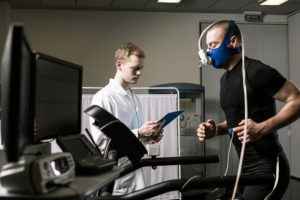
20 healthy young men aged 21 years used a cycle ergometer at about 50% of their physical capacity for 10 minutes followed by maximum intensity exercise for another 30 minutes. This sequence was repeated 3-times, and after the 4th series, each participant continued at the highest speed they could sustain for 20 minutes.
This protocol was performed twice: once with and once without Tryptophan. Researchers found peak power output during the last 20 minutes were higher on trials performed with Tryptophan than those who performed on a placebo.[xvi]
Another trial in Spain recruited 12 healthy sportsmen who ran on a treadmill until exhaustion. Once while supplementing with Tryptophan and once with a placebo.
Total exercise time, perceived exertion rate, maximum heart rate, peak oxygen consumption, pulse recovery rate, and excess post-exercise oxygen consumption were determined during the two trials.
Total exercise time was nearly 50% greater after receiving Tryptophan than after receiving a placebo. Perceived exertion rate was lower when using Tryptophan.
The researchers concluded that the longer exercise time could be due to increased pain tolerance as a result of Tryptophan supplementation.[xvii]
Tryptophan Relieves Symptoms of Seasonal Affective Disorder
Seasonal Affective Disorder (SAD) is a form of depression experienced by many during the winter months. Symptoms include difficulty waking, decreased energy, weight gain, carbohydrate craving, difficulty concentrating, decreased libido, withdrawal, anxiety, depression and irritability.
The first order of treatment is often light therapy. But many do not respond to light therapy typically because of a mutation in the melanopsin gene and the associated signaling pathway between the retina and the pineal gland.[xviii]
The pineal gland in your brain is your source of melatonin which influences sleep cycles. Melatonin is synthesized from serotonin which is synthesized from Tryptophan.[xix]
So if light therapy doesn’t work, possibly supplementing with Tryptophan to stimulate production of serotonin and melatonin could be effective.
Researchers at the University of British Columbia in Vancouver, Canada set out to find if Tryptophan could help those with Seasonal Affective Disorder (SAD) where light therapy failed.
Patients were treated for 2 weeks using light therapy. Those who did not respond to light therapy were treated with 1 g Tryptophan 3-times per day for 2 weeks while continuing light therapy.
The addition of Tryptophan resulted in a significant reduction in depression. 64% of the patients in this study showed very good clinical responses to the combined treatment with minimal side effects.[xx]
Tryptophan Recommended Dosage
Recommended dosage of Tryptophan is 500 – 1,000 mg per day for cognitive benefit.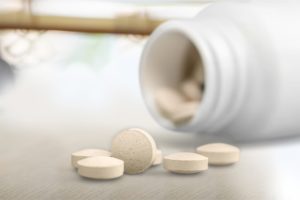
The University of Michigan Health Department recommends much higher doses for:
- Lowering appetite and cravings: .5 – 2 grams per day
- Depression or Anxiety: 2 – 6 grams per day (with medical supervision)
- Chronic pain or migraines: 2 – 4 grams per day in divided doses
- Sleep disorders or insomnia: 1 – 2 grams at bedtime[xxi]
Tryptophan is a precursor to the neurotransmitter serotonin in the brain. Tryptophan hydroxylase is the rate-limiting enzyme needed for serotonin production. And requires magnesium and Vitamin B6 to synthesize serotonin.
Tryptophan is also a precursor to the synthesis of Vitamin B3 (niacin). So if you don’t have enough niacin in your body, supplementing with L-Tryptophan will not efficiently produce serotonin because it’s being used to produce niacin. Which also depletes stores of the vitamin cofactors B1, B2 and B6.
So supplement L-Tryptophan with a B-Vitamin complex that includes Vitamins B3 and B6, and magnesium.
Note that some of the clinical trials used in this post use much higher doses of Tryptophan. Which is not recommended and usually not necessary.
Too much Tryptophan will make you sleepy. And could produce excess levels of 5-HTP and serotonin which can lead to Serotonin Syndrome.
Tryptophan Side Effects
Tryptophan is a normal part of your diet and considered non-toxic and safe at recommended doses.
But in the unlikely event that you already have adequate levels of Tryptophan in your body, supplementing with more could cause problems. As can dosing more that the recommended amount.
Tryptophan could cause stomach upset, loss of appetite, nausea, heartburn, drowsiness, headaches, dry mouth and sexual problems.
Start at the lowest dose to see how your body reacts. When first starting with L-Tryptophan take your dose in the evening to avoid possible drowsiness issues.
Caution: Low to moderate doses of Tryptophan (30 mg per pound of body weight), or about 4.5 grams for the average 165 lb. adult is considered safe and free of side effects. However, most don’t need to dose at nearly these levels.
DO NOT use L-Tryptophan if you are taking antidepressant medications including SSRI’s. Because these drugs delay normal degradation of serotonin in brain synapses leaving more serotonin circulating in your brain.
Too much Tryptophan in combination with these drugs can produce Serotonin Syndrome which can lead to delirium, involuntary muscle contractions, high fever, and coma. And worse case and a very real scenario is death.[xxii]
Type of Tryptophan to buy
L-Tryptophan is available in tablet and capsule form usually 500 – 1,000 mg.
You also get Tryptophan in foods you eat including chocolate, oats, bananas, dried dates, milk, cottage cheese, meat, fish, turkey, and peanuts.
Approximately 300 mg of Tryptophan is available in three ounces of turkey, lamb, beef, tuna, or peanuts. Fortunately, relative to other amino acids, small amounts are needed for a therapeutic effect.
And you get 200 mg L-Tryptophan in Click for Performance Lab® Sleep which also contains 100 mg magnesium (as Magnesium Bisglycinate, Magnesium Taurate, & NutriGenesis® Magnesium) and 500 mg Montmorency Tart Cherry (as CherryPURE®).
But there are all kinds of reasons why your body may not be making good use of the Tryptophan you’re getting from food. See “Tryptophan Benefits” for more on why it may be a good idea for you add Tryptophan to your stack.
Nootropics Expert Recommendation
Tryptophan 500 – 1,000 mg per day
 I recommend using Tryptophan as a nootropic supplement.
I recommend using Tryptophan as a nootropic supplement.
Your body does get some Tryptophan from the food you eat. But this amino acid is competing with other amino acids for transport to your brain. It’s competing for the same receptors. And carbohydrates vs. proteins in your meals can affect Tryptophan’s ability to synthesize serotonin in your brain.
Supplementing with L-Tryptophan will make more of this amino acid available to synthesize serotonin and melatonin.
L-Tryptophan is especially helpful for those with low serotonin levels. Boosting this crucial neurotransmitter can help alleviate insomnia, pain, depression and anxiety.
Start with 500 mg of L-Tryptophan per day and take it in the evening. See how your body reacts and how you feel the next day. Increase the dose to no more than 2 grams per day as needed. And watch for side effects.
L-Tryptophan requires adequate levels of Vitamin B3, B6 and magnesium for serotonin synthesis. So add a good B-Complex vitamin and magnesium to your stack when using L-Tryptophan.
And if you’re dealing with insomnia, consider trying Click for Performance Lab® Sleep

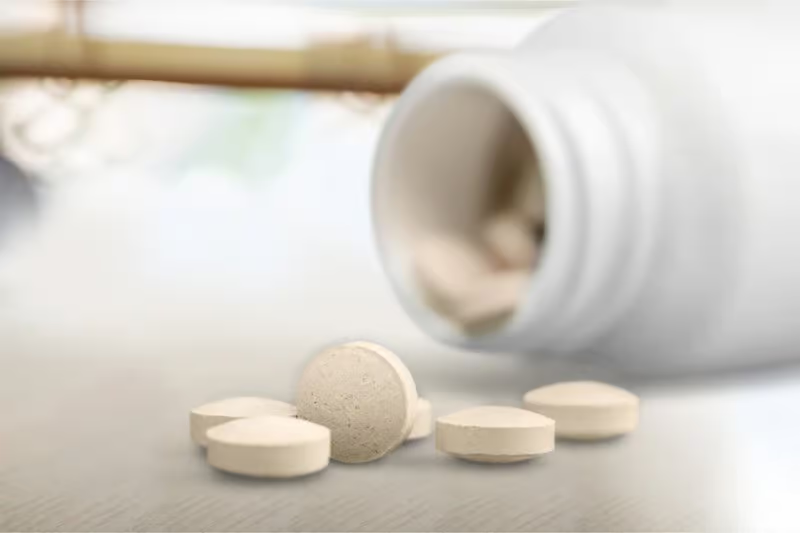
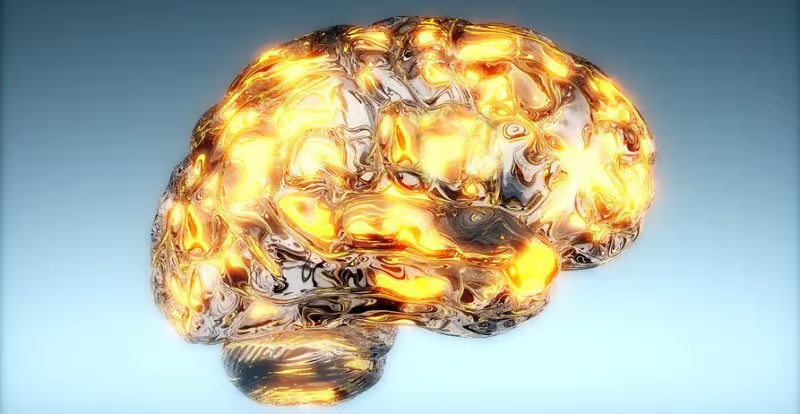






Join The Discussion - 388 comments
Zanzara
April 7, 2024
Hi David,
I tapered off SAMe for mild depression because it was longer helping, and I have been taking 30 mg Saffron along 500 mg Tyrosine each day for a while. It’s been helping with my concentration and mood to dome extent, but I’m wondering if adding a low dose of Tryptophan might improve my situation. Is it safe to combine all three of these supplements? I also take a small dose of L Theanine for anxiety.
Thanks!
David Tomen
April 8, 2024
Zanzara, it would help if you did a second dose of L-Tyrosine about 5 hours after your first dose. That way you’ll get dopamine throughout your day.
L-Theanine 100 mg 2 or 3-times per day helps take the edge off. And it helps to boost serotonin with L-Tryptophan but use it before bed because serotonin helps make melatonin which will help you sleep.
Paul McG
March 20, 2024
What dose of Tryptophan is equivalent to 50mg of SSRI (Sertraline) ?
David Tomen
March 21, 2024
Paul, there is no direct correlation because SSRIs do not increase serotonin. They only affect how the existing serotonin that is already in your brain works.
Tryptophan is a precursor to serotonin synthesis. So when you take it as a supplement it will “increase” your serotonin levels.
salem
February 6, 2024
hi david
can i take 500mg tryptophan Daily for years ?
wont that cause sertonin syndrome ?
and i can take like 3 times per week? or it should be taken daily?
David Tomen
February 6, 2024
Tryptophan on its own cannot cause Serotonin Syndrome. But if you combine a high dose of Tryptophan with an SSRI is could be deadly.
Rooney
February 3, 2024
Hey David,
im taking a ssri, will it suppress dopmain like tryptophan in the long term, so do you think that it makes sence to take L tyrosin with it ?
thanks a lot
David Tomen
February 5, 2024
Rooney, SSRIs do not directly or physically increase serotonin. So it cannot cause serotonin to suppress dopamine. It would not hurt to use L-Tyrosine during the day especially if you are 40+ years old or older.
Rooney
February 8, 2024
Thanks David for your replay, then if i take L Tyrosin will it not supress Serotonin? could i combine maybe a small dose of Troptophan e.g. 250g with ssri( im taking just 1/3 of the highst dose) or it could be still dangerous.
Thanks a lot, im asking because i think i have less level of Dopamin but i don’t wanna take any other medications which affects dopamin.
David Tomen
February 9, 2024
Rooney, it take a high dose of Tyrosine to suppress serotonin. I mean doses of above 1500 mg per day of Tyrosine. But everyone is different on how their system uses these amino acids.
The average human adult as we grow older need at least 500 mg Tyrosine twice per day to keep our dopamine levels optimal. But we also need to support serotonin as we get older too. I have found 500 mg Tryptophan before bed is enough to support my serotonin levels. It is highly unlikely that a dose like that would cause problems with an SSRI. But again, it depends on your system.
I’m sorry I cannot be more specific than that. You need to experiment but carefully if you are using a SSRI.
Petrus
December 18, 2024
Hi David
Is L-Tryptophan safe for long term use? Im taking it 1-2g per day. Morning and before i go to bed.
I am sensitive guy and i have naturally lower serotonin levels, and noticed it helps a lot for my mood, anxiety and depression symptoms
David Tomen
December 22, 2024
Petrus, Tryptophan is safe to use long-term but be careful about increasing only serotonin. Excess serotonin can suppress dopamine which could cause more problems. Those two need to be in balance. Try adding 500 mg Tyrosine twice per day and see how that works.
Gerges
January 12, 2024
hi David, I took a dose of 200 mg of tryptophan at night and it caused me insomnia and alertness, knowing that I take tyrosine in the morning at a dose of 800 mg. Should I take tryptophan in the morning?
David Tomen
January 14, 2024
Gerges, L-Tyrosine needs to be used twice per day – morning and noon 400 – 500 mg each time. The 800 mg you take in the morning is gone by noon and after that no longer makes dopamine.
Most use L-Tryptophan before bed because it makes serotonin which goes on to make melatonin. You could try a low dose like 200 mg in the morning and it should not make you sleepy because it is such a low dose.
Ben P
February 5, 2024
Knowing the mechanism of melatonin production, I think more people should consider supplementing L-Tryptophan earlier in the day. Many people might need to feel Serotonin production ramped up during the day to balance their neurotransmitters and mood during the hours they are needed to be productive in society.
David Tomen
February 5, 2024
Ben, I personally have found taking 500 mg L-Tryptophan about 90 minutes before bed helps me sleep. But if done consistently night after night you get the benefit of serotonin during the day. You could use Tryptophan earlier in the day of course if it does not make you sleepy.
hajnda
January 6, 2024
hi David , I just started taking L-Tryptophan powder 500mg. I started taking because it showed low tryptophan levels in my neurotransmitters test. My memory was affected. It only gave me short nights. I’m woken at 1:30 am and can’t sllep after that.
So instead I take it in the morning and GABA 500 mg at night with Tart Cherry juice. I sllep better with tis combination.
David Tomen
January 9, 2024
Neurotransmitter tests are useless which I am sure is a disappointment to many. The serotonin and GABA used by your brain is primarily made in your brain. And the only way to measure that is to autopsy your brain. Which is rather inconvenient while you are alive.:-)
The only accurate way to test neurotransmitters is to use precursors to increase each one and do it one at a time and see how you feel. The key to success with nootropics is the willingness to experiment which is exactly what you are doing.
Paul McG
March 20, 2024
Hey David,
Great site and it’s been invaluable in helping cure my migraines, so thank you!
I started SSRI back in November (sertraline 50mg) along with some nootropics to target the anxiety caused from ADHD (which was resulting in migraine) and quit the sertraline 2 months later, moving over to Tryptophan 240mg.
I made the mistake of trying a tablet whilst weaning off Sertraline, and 10 minutes later suffered only what I can describe as a bout of rotational vertigo/epileptic vertigo.
The room would slowly then fastly spin to the left, slow down and spin to the right, before slowing and stopping.
I lowered my dose of both tablets and all was fine, moving onto tryptophan only.
2 months later, I’ve just had a very similar experience, it started with what I can only call “rubber banding” in my vision, as if I was looking side to side rapidly.
Apparently my eyes were not moving whilst this occured, which makes me think this is more neurological.
I had added a dose of 5htp (500mg) that afternoon, along with a tyrosine to maintain balance, and a Valerian Root a few of hours later for the GABA, as I wound down for the night.
Do you think this was likely triggered by the serotonin boost? I took the tyrosine and gaba to try and maintain balance, but I can only think it still boosted my serotonin too much (similar to when I took sertraline and tryptophan).
I know there is a crossover in symptoms between migraine, menieres and epilepsy (headache, dizzyness, tinnitus) butnthese are the only times ive ever experience full on room spinning vertigo.
I have a GP appointment this week and will likely ask for an EEG, just curious on your thoughts?
David Tomen
March 21, 2024
Paul, what you experienced was the beginning stages of Serotonin Syndrome. Which if it went any further could have killed you.
Do NOT use anything that increases serotonin while you are using a SSRI because it can be deadly.
It is true that serotonin and dopamine must be in balance but that is a minor concern in this instance. You are very fortunate sir so please be careful what you take in the way of supplements in the future while you are using any type of antidepressant or antianxiety med.
samer
October 6, 2023
What is the appropriate dose of tryptophan so that it does not affect the dopamine balance?
In the long term if I suffer from depression.
David Tomen
October 6, 2023
Standard and long-term adult dosage for L-Tryptophan is 500 mg and that should not upset your serotonin and dopamine balance. Any higher than that depends on your system and how you respond to this supplement.
Christian
October 3, 2023
My symptoms pointed towards low serotonin so I’ve had some good results using 800mg L-Tryptophan (PM) + 1000mg L-Tyrosine (PM).
Prior to this I was taking 5mg of Lithium Orotate. Is it safe to reintroduce this back into the stack in the AM?
David Tomen
October 5, 2023
Christian, Lithium Orotate is safe to use with either one or both.